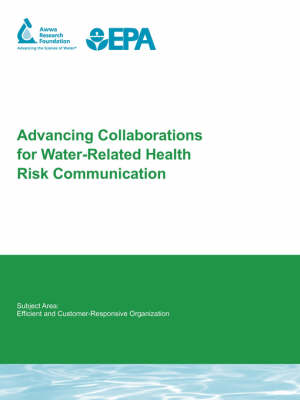Water Research Foundation Report
1 total work
Advancing Collaborations for Water-Related Health Risk Communication
by Rebecca Parkin, Lisa Ragain, Rebecca Bruhl, H. Deutsch, and Davis P. Wilborne
Published 31 March 2007
A range of existing and emerging concerns pose potential threats to drinking water quality and utilities' credibility with customers. The early involvement of public health officials and clinicians is essential for addressing these issues and for building and maintaining effective collaborations before an emergency event. Utilities must be prepared to form new and maintain existing collaborations designed to address these concerns.
The purpose of this project was to develop communication strategies and tools that would enable water utilities, the public health community, and clinicians to collaborate and strengthen their capabilities for addressing water-health risk issues in normal and emergency conditions. The specific objective of this project was to design a Framework for Action with supporting materials to facilitate effective and dynamic partnerships for and beyond the utility service areas directly involved in this project. This initiative included three major components: data collection, data analysis, and developing the Framework for Action. These components required gathering and assessing peer-reviewed literature and field data about existing communication capabilities, and the subsequent development, testing, and distribution of an evidence-based framework.
The specific activities conducted were literature reviews; interviews of utility, public health, and clinical personnel; an interdisciplinary workshop including presentations of case studies and group discussions; qualitative and quantitative data analyses; synthesis and interpretation of the data; preparation and field evaluation of a draft Framework; compilation of the lessons learned from testing the Framework; and finalization and dissemination of the Framework and the project's results.
The purpose of this project was to develop communication strategies and tools that would enable water utilities, the public health community, and clinicians to collaborate and strengthen their capabilities for addressing water-health risk issues in normal and emergency conditions. The specific objective of this project was to design a Framework for Action with supporting materials to facilitate effective and dynamic partnerships for and beyond the utility service areas directly involved in this project. This initiative included three major components: data collection, data analysis, and developing the Framework for Action. These components required gathering and assessing peer-reviewed literature and field data about existing communication capabilities, and the subsequent development, testing, and distribution of an evidence-based framework.
The specific activities conducted were literature reviews; interviews of utility, public health, and clinical personnel; an interdisciplinary workshop including presentations of case studies and group discussions; qualitative and quantitative data analyses; synthesis and interpretation of the data; preparation and field evaluation of a draft Framework; compilation of the lessons learned from testing the Framework; and finalization and dissemination of the Framework and the project's results.
